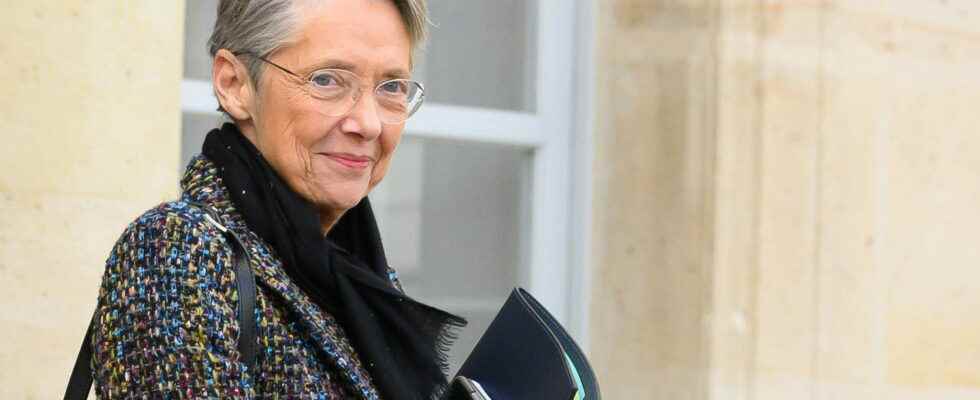Elisabeth Borne. This Thursday, February 2, Elisabeth Borne was a guest of the program L’Événement on France 2. The Prime Minister reaffirmed her desire to pass the pension reform.
[Mis à jour le 2 février 2022 à 21h09] “Me, my responsibility is to tell the truth to the French.” From the start of France 2’s political program, L’Événement, Elisabeth Borne reaffirmed the importance, in her view, of passing the pension reform. According to her, this is the only way to preserve the current system: “I tell them that it is essential to carry out a reform to preserve our pay-as-you-go system.” If the head of government repeated that she heard “the reluctance, the concerns, the questions” of her fellow citizens, she did not say that she would go back on this or that commitment. Elisabeth Borne, on the contrary, insisted once again, saying that this reform is “indispensable”. This is why she asked the French to be well aware of it: “A pension reform is a collective effort and it affects everyone.”
Elisabeth Borne is moving against the wind with her pension reform. If the government was initially confident in its strategy, assured of the support of the entire branch of the Republicans in the National Assembly and banking on the erosion of union forces, the uproar aroused by the pension reform has reshuffled the cards. More united than ever, the eight French trade union federations are organizing a common front with the approval of the majority of French people who refuse to extend working hours by two years or more. And this mobilization has cooled more than one elected on the right, and even within the majority. However, Elisabeth Borne cannot and above all does not want to back down on the text after announcing as “non-negotiable” the postponement of the legal retirement age.
Pension reform: Elisabeth Borne VS the unions
Rather discreet since the presentation of the reform, except for a few outings, Elisabeth Borne goes to the front. The Prime Minister must answer questions from Caroline Roux and Nathalie Saint-Cricq to enlighten the French on the future of pensions, but the exercise does not consist in presenting her arguments, it is also necessary to answer the criticisms of the unions, also invited. And these answers must be solid because followed by debates between the different political and union forces involved in the pension reform.
After the interview with Elisabeth Borne, the voice of government will be carried by Gabriel Attal, Minister of Public Accounts who will face Clémentine Autain for Nupes, Jordan Bardella for the National Rally and Eric Ciotti for Les Républicains. Some trade unionists will also be part of it like Laurent Berger, boss of the CFDT.
No inflection of Elisabeth Borne on the pension reform
The Prime Minister wants to hold her positions on pensions, but the repeated social movements are gradually weakening her support. To the point where an emergency meeting was held on February 1 between her, the president of the Republicans Eric Ciotti and the boss of the group of right-wing deputies Olivier Marleix to close ranks. The LR vote in the National Assembly is essential to hope to see the text adopted. Problem: several elected officials are no longer as inclined to vote for the reform, not without improvements desired by the party – which has demands on the employment of seniors or long careers – or claimed by the demonstrators.
Small steps aside that the government has said it is ready to take as long as the substance of the project – to understand extending working hours from 62 to 64 – remains unchanged. But the majority has already shown that it has difficulty in readjusting the imbalances concerning women or young people by referring to the parliamentary debate for the first modifications. However, we must expect sterile exchanges, non-constructive attacks only punctuated, sometimes, by small advances during the examination of the reform in the hemicycle.
Elisabeth Borne changes her tone on pensions
Faced with repeated criticism, the government has changed its paradigm and no longer presents pension reform as “just” and a sign of social improvement, but as a “necessary” project that requires effort. But here again the urgency of reforming the pension system is not justified for everyone. The opposition even boasted about the words of Pierre-Louis Bras, president of the Pensions Orientation Council (COR) who in the 2022 report wrote that “pension expenditure is relatively under control”. The fact is that if the projections are less alarmist than the speech of the executive, all the camps can find water to feed their mill in the various advanced scenarios as pointed out by Pascal Perri, economic specialist of TF1/LCI.
This notion of necessary efforts is taken up and declined by more political and less technocratic weights in government. Gérald Darmanin, Minister of the Interior, for example, opposed the “work value” to the “lazy bobo leftists” in the columns of the Parisianwhile Minister Gabriel Attal has closed the door to increasing certain taxes to pay pensions.
